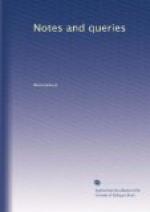I am not able to answer W.H.C.’s 4th and 5th questions.
[Greek: Phi.]
Execution of Charles I. (Vol. ii., p. 72.).—The late Mr. Rodd had collected several interesting papers on this subject; and from his well-known acquaintance with all matters relating to English history, they are no doubt valuable. Of course they exist. He offered them to the writer of this note, on condition that he would prosecute the inquiry. Other engagements prevented his availng himself of this liberal offer.
J.M.
Woburn Abbey.
Swords (Vol. i., p. 415.).—Swords “ceased to be worn as an article of dress” through the influence of Beau Nash, and were consequently first out of fashion in Bath. “We wear no swords here,” says Sir Lucius O’Trigger.
WEDSECUARF. {111}
The Low Window (Vol. ii., p. 55.).—In Bibury Church, Gloucestershire, are several windows of unusual character; and in the chancel is a narrow, low window, called to this day “the Lepers’ window,” through which, it is concluded, the lepers who knelt outside the building witnessed the elevation of the host at the altar, as well as other functions discharged by the priest during the celebration of mass.
ROBERT SNOW.
Brasichelli’s Expurgatory Index (Vol. ii., p. 37.).—Although unable to reply to MR. SANSOM’s Query, by pointing out any public library in which he can find the Ratisbon reprint of Brasichelli’s Expurgatory Index, I beg to state that I possess it, the Bergomi reprint, and also the original, and that MR. SANSOM is perfectly welcome to a sight of either.
C.J. STEWART
11. King William Street, West Strand.
Discursus Modestus (Vol. i., pp. 142, 205.)—Crakanthorp, in his Defens. Eccl. Angl., cap. vi. p. 27. (A.C.L. edition), refers to Discur. Compen. de Jesuit. Angl., p. 15., and quotes from it the words, “Omnia pro tempore, nihil pro veritate.” Is this Discur. Compen. the Discurs. Modest.? and are these words to be found in Watson’s Quodlibets? This would fix the identity of the two books. It is curious that the only two references made by Bishop Andrews to the Discurs. Modest. (Respons. ad Apol., pp. 7. and 117.) are to page 13., and both the statements are found in page 81. of Watson. Crakanthorp, however (p. 532.), quotes both the works,—Discurs. Modestus de Jesuit. Anglic., and Watson.
From the many different Latin titles given to this book, it seems certain that it was originally written in English, and that the title was Latinized according to each person’s fancy. There is no copy in the Lambeth library.
J.B.
Melancthon’s Epigram.—Melancthon, in the epigram translated by RUFUS (Vol. i., p. 422.), seems to have borrowed the idea, or, to use the more expressive term of your “Schoolboy”, to leave cabbaged from Martial’s epigram, terminating thus:—




